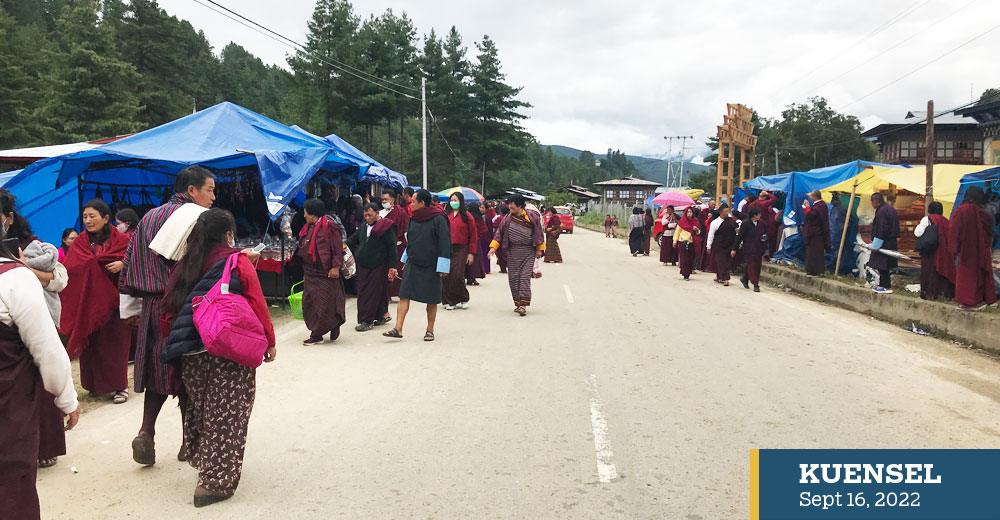Choki Wangmo | Bumthang
After a long pause without income opportunities in the past three years, more than 150 small-scale businesses mushroomed nearby a religious event venue in Chumey, Bumthang.
Business owners who came from as far as Tashiyangtse in the east said that the five-day empowerment bestowed by Garab Rinpoche at Jangchub Gawai Tshel monastery helped them earn from the sales.
The temporary stalls built nearby the highway is brimming with colours—jewellery, children’s toys, ritual objects, scripts, snack stands, clothes, bamboo crafts, and woodwork among others—are displayed for a stretch of a few kilometres.
Rina Rai and Devika Rai drive more than 20kms from Kurje every day to sell snacks at the stand in Chumey. The two sisters make snacks such as chatpati, panipuri, and puri late into the night.
“It is tiring but we need income,” said the sisters.
They earn about Nu 2,000 a day. The sales increased yesterday, the last day of the empowerment.
“This is the first time we started this business after the pandemic. We used to sell snacks during festivals before the pandemic,” said Rina Rai, the mother of four.
Her husband looks after their children at home.
Pema came from Phuentsholing. He sells ritual objects. In the last five days, he earned about Nu 1,70,000.
This is the second time since he went across the country selling ritual objects after the pandemic restrictions were relaxed. “The sales are not as good as pre-pandemic times and the prices of things have increased by Nu 200,” he said, adding that door-to-door sales are better than retail businesses.
Pema Dorji and his family came from Tashiyangtse with wood products. Although most of his markets are in Thimphu and Paro, he said that he could sell products worth Nu 10,000. “The expenditure is more than the income earned. Woodwork is a long tedious process.”
Sangay Wangmo and her husband came from Thimphu to sell clothes. It is her first time going around selling clothes after relaxation. “The business was better before the pandemic. Children’s toys sell more,” she said.
She earned Nu 20,000 in six days compared with Nu 50,000 she earned in three days before the pandemic.
“We are in competition with the wholesalers. They sell at a cheaper rate compared with us. The expenditure has also increased now,” she added.
While travelling, she keeps her youngest child with a relative. However, the sales depend on the nature of the event.
Most of the business owners sleep in the stalls. They stay late into the night and open early morning.
They have to pay Nu 1,000 to the gewog centre for waste management and Nu 200 to the Bhutan Power Corporation for energy use.
About 10,000 people from across the country attended the teachings that began on September 10 and ended yesterday.


